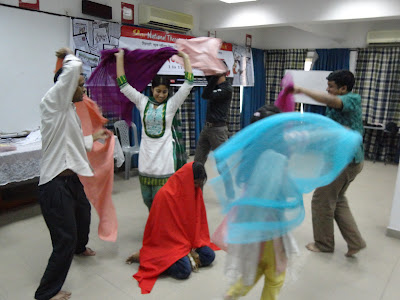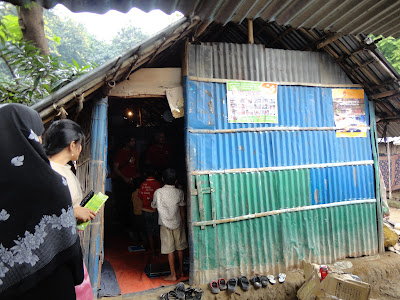Creating Sacred Space
As the accident affected so many people in so many different ways we decided to create a spontaneous play using just five main characters relevant to the tragedy, no script, just improvisation. Our intention was to then invite those from the audience who felt moved to or wanted to say something to one of the characters or as one of the characters to come do or say what they needed to say.
When tragedy occurs and life ends suddenly, those left behind often feel they didn't get to say goodbye or there is a need to say one last thing or embrace the person who has died one final time. It is our belief and that of many others in the field of Expressive Arts that drama can be a wonderful container and healing tool for expressing the unspoken words that can otherwise stay stuck in our hearts forever.
The five characters we chose for our "play" were:
1) The children who died
2) Parents of those who died
3) Brothers/Sisters of those who died
4) Friends of those who died
5) School Teachers of those who died
It is possible for one person to represent and speak as a group of people. It is sometimes a very strong experience to take on the role of a group of people, especially a group in distress. Again we want to acknowledge our teams depth of compassion and strength of spirit to step into these roles so willingly to help begin the healing process of their fellow countrymen.
Final Preparations
Connecting Everyone
To be able to create such a sacred space for healing we needed to unite everyone, so whilst Shishir and Sudarshan are connecting with the audience, the players (right of the picture) are centering and focusing together their intention of the work about to be done.
It has always been our belief that we are like channels for the work we do. Whenever we are about to start work, be it with Dynamic Theatre or any other kind of expressive art, we have a silent prayer running through our mind and hearts, and that is to remember we are like a "Hollow Bone" which means to let yourself go totally into the experience of whatever is about to happen, and let the wisdom of the Universe flow through you. The process of "Hollow Bone" can be found in many different ancient traditions, basically translated it means:-
"I am but the vehicle for the energy of the Universe,
and it is the love in my heart that makes the difference"
No one can imagine how a parent must feel
to hear the news of the death of your child
Or the shock of losing an older brother
How do you react as a parent?
These are the opening scenes from our improvised play, by making it as emotive as possible we aimed to offer a safe place for people to express emotions, for many these emotions had been held inside since the accident in July.
Everyone becomes involved
Whilst we could not bring the children back we could allow people the sacred space to cry, grieve and join together in their pain and loss, by letting unspoken words be spoken, by letting a river of tears flow and allowing people to ride that stormy river we could guide them to the soothing and healing waters further upstream with the view of a new day dawning.

By allowing deep emotions to flow through us we allow the healing process to begin. Problems arise when we block the flow. These two boys in the photo, one centre right and the other surrounded by a magenta cloth came into the play to say goodbye to their friends, in the end they sang a traditional folk song to honour and remember all the friends they had both lost. It enabled a cathartic process for them and for all their friends. We honour them for their courage of stepping into the centre of the river and allowing the tears to flow, in so doing their openness and vulnerability brought about healing not only for themselves but for their community as well.
"Let the scars of the heart be seen,
for by their scars are known the Men and Women
who walk the way of love"
Farid ud-Din Attar







































